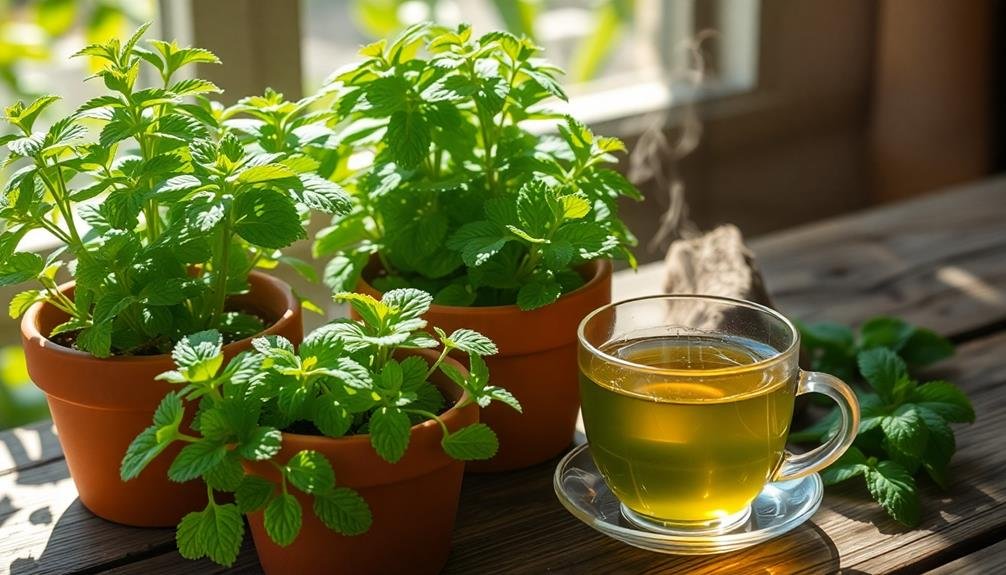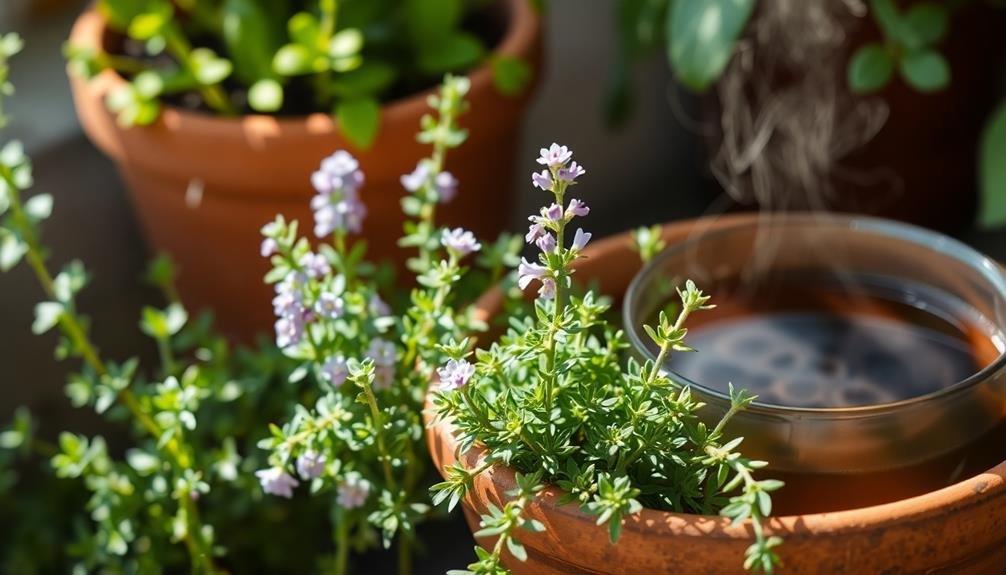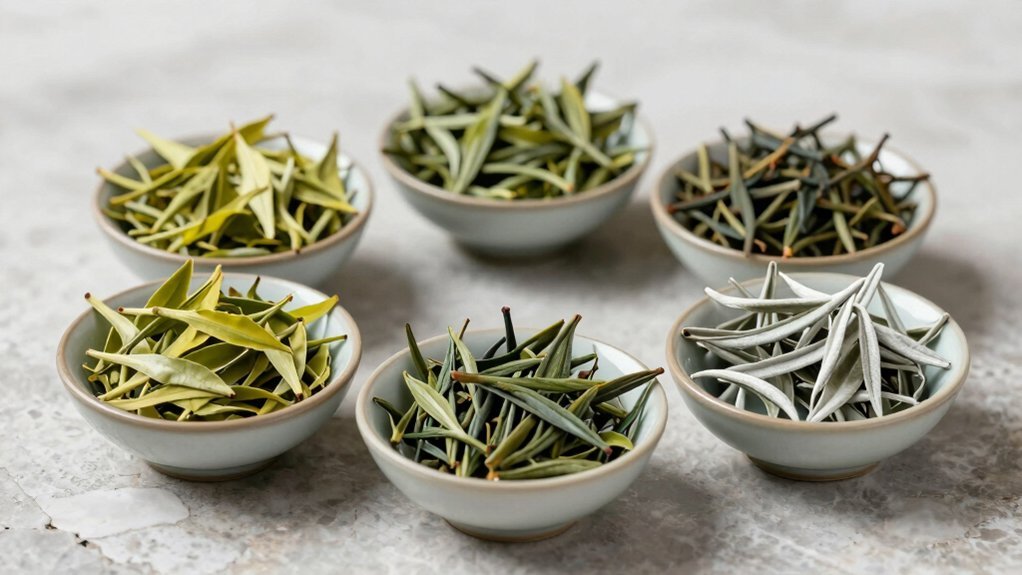You can easily grow these five organic herbs for delicious homemade tea: peppermint, chamomile, lemon balm, lavender, and thyme. Peppermint offers a revitalizing flavor and aids digestion, while chamomile promotes relaxation. Lemon balm provides a citrusy stress-relief, and lavender helps improve sleep quality. Thyme boosts your immune system and supports digestive health. Each herb has unique growing requirements, from peppermint's need for moist soil to lavender's preference for dry conditions. With minimal care, you'll soon be harvesting fresh herbs for soothing, flavorful teas. Discover how these aromatic plants can transform your garden and your daily cup.
Peppermint: Refreshing and Versatile

Imagine sipping a soothing cup of homegrown peppermint tea. You'll find peppermint to be one of the easiest and most rewarding herbs to grow for your tea garden. This versatile plant thrives in partial shade and moist soil, making it ideal for many climates.
To start, plant peppermint in a container to control its vigorous growth. It spreads quickly and can overtake your garden if left unchecked. Choose a pot with good drainage and fill it with rich, organic potting soil. Place the container in a spot that receives morning sun and afternoon shade.
Water your peppermint regularly, keeping the soil consistently moist but not waterlogged. Harvest the leaves just before the plant flowers for the best flavor. You can use fresh leaves immediately or dry them for future use.
Peppermint tea offers numerous benefits beyond its invigorating taste. It's known to aid digestion, relieve headaches, and boost energy. You can also blend it with other herbs like chamomile or lemon balm for unique flavor combinations.
With proper care, your peppermint plant will provide you with an abundance of leaves for delicious, homemade tea year-round.
Chamomile: Calming Garden Favorite
Along with peppermint, chamomile stands out as a must-have herb for your tea garden. This daisy-like flower is renowned for its calming properties and delicate apple-like flavor. You'll find two main varieties: German chamomile (Matricaria recutita) and Roman chamomile (Chamaemelum nobile). Both are easy to grow and offer similar benefits.
To cultivate chamomile, choose a sunny spot with well-draining soil. Sow seeds directly in the garden after the last frost, or start them indoors 6-8 weeks before. Once established, chamomile is drought-tolerant and requires minimal care. Harvest the flowers when they're fully open, usually in the morning after the dew has dried.
Here's a quick guide to chamomile's benefits and uses:
| Benefit | Use |
|---|---|
| Promotes relaxation | Evening tea |
| Aids digestion | After-meal drink |
| Soothes skin | Topical compress |
| Supports immune system | Daily tonic |
| Enhances sleep quality | Bedtime ritual |
Dry your harvested chamomile flowers in a cool, dark place for about a week. Once dried, store them in an airtight container away from light. You'll enjoy the soothing effects of your homegrown chamomile tea all year round.
Lemon Balm: Citrusy Stress-Reliever

With its bright, lemony aroma and stress-relieving properties, lemon balm (Melissa officinalis) is a valuable addition to your organic tea garden. This perennial herb thrives in partial shade and well-drained soil, making it easy to grow in most climates.
You'll find that lemon balm spreads quickly, so consider planting it in containers to control its growth.
To harvest lemon balm, simply snip the leaves and stems just above a leaf intersection. For the best flavor, pick the leaves before the plant flowers. You can use fresh leaves immediately or dry them for later use.
To dry, hang small bunches in a warm, dark place with good air circulation.
Lemon balm tea is known for its calming effects and can help reduce anxiety and improve sleep quality. It's also rich in antioxidants and may support cognitive function.
To brew, steep 1-2 teaspoons of dried leaves (or 2-3 teaspoons of fresh leaves) in hot water for 5-10 minutes. You can enjoy lemon balm tea on its own or blend it with other herbs like mint or chamomile for a more complex flavor profile.
Lavender: Aromatic Sleep Aid
Known for its soothing fragrance and calming properties, lavender (Lavandula angustifolia) is a must-have herb for your organic tea garden. This versatile plant not only adds a beautiful touch to your landscape but also offers numerous health benefits when brewed as a tea.
You'll find that growing lavender is relatively easy, as it thrives in well-drained soil and full sun. To cultivate lavender, choose a sunny spot in your garden and plant it in spring or early summer. Water sparingly, as lavender prefers dry conditions. Prune the plant regularly to maintain its shape and promote healthy growth.
When harvesting, cut the stems just before the flowers fully open for the best flavor and aroma. To make lavender tea, steep a teaspoon of dried lavender buds in hot water for 5-10 minutes. You can also blend it with other herbs like chamomile or mint for a more complex flavor profile.
Lavender tea is renowned for its ability to reduce anxiety, improve sleep quality, and alleviate headaches. It's best enjoyed in the evening to help you unwind and prepare for a restful night's sleep.
Thyme: Immune-Boosting Brew

While lavender soothes your senses, thyme (Thymus vulgaris) packs a powerful punch for your immune system. This hardy perennial herb is rich in antioxidants and volatile compounds that can help ward off infections and boost your overall health.
Growing thyme for tea is easy, as it thrives in well-drained soil and full sun.
To brew a cup of thyme tea, harvest a small bunch of fresh stems and leaves, rinse them gently, and steep in hot water for 5-10 minutes. You'll enjoy a warm, slightly minty, and earthy flavor that's both comforting and invigorating.
Thyme tea can help:
- Relieve coughs and respiratory issues
- Reduce inflammation in the body
- Support digestive health
For the best results, harvest thyme in the morning after the dew has dried but before the sun becomes too intense. This is when the herb's essential oils are most concentrated.
You can also dry thyme for later use by hanging small bundles in a warm, dry place away from direct sunlight. Once dried, store the leaves in an airtight container to preserve their potency and flavor.
Frequently Asked Questions
How Long Does It Take for Herb Plants to Grow From Seeds?
You'll find that herb growth varies. Most herbs take 7-14 days to germinate and 6-8 weeks to reach a harvestable size. Some slow-growing herbs might take several months. It's best to check specific herb varieties for precise timelines.
Can These Herbs Be Grown Indoors Year-Round?
Yes, you can grow herbs indoors year-round. You'll need to provide adequate light, either from a sunny window or grow lights. Guarantee proper watering, good drainage, and appropriate temperature. Some herbs may require extra care in winter months.
What's the Best Way to Dry Herbs for Tea?
To dry herbs for tea, you'll want to hang them in small bundles in a warm, dry, well-ventilated area. You can also use a dehydrator or oven on low heat. Make certain they're completely dry before storing.
Are There Any Herbs That Shouldn't Be Mixed Together in Tea?
You shouldn't mix certain herbs in tea due to potential interactions. Avoid combining St. John's Wort with other herbs, and be cautious with licorice root. It's best to research each herb's properties before blending them together.
How Often Should I Harvest Herbs to Encourage Continued Growth?
You should harvest herbs regularly, typically every 2-3 weeks during their growing season. Don't take more than 1/3 of the plant at once. Frequent pruning encourages bushier growth and prevents flowering, which can alter flavor.
In Summary
You're now equipped to create your own organic tea garden! By growing these five herbs, you'll have a variety of flavors and health benefits at your fingertips. Remember to harvest leaves regularly and dry them properly for the best taste. Don't be afraid to experiment with blends and ratios to find your perfect cup. With a little care and patience, you'll soon be sipping homemade, organic teas that are both delicious and beneficial to your well-being.





Leave a Reply